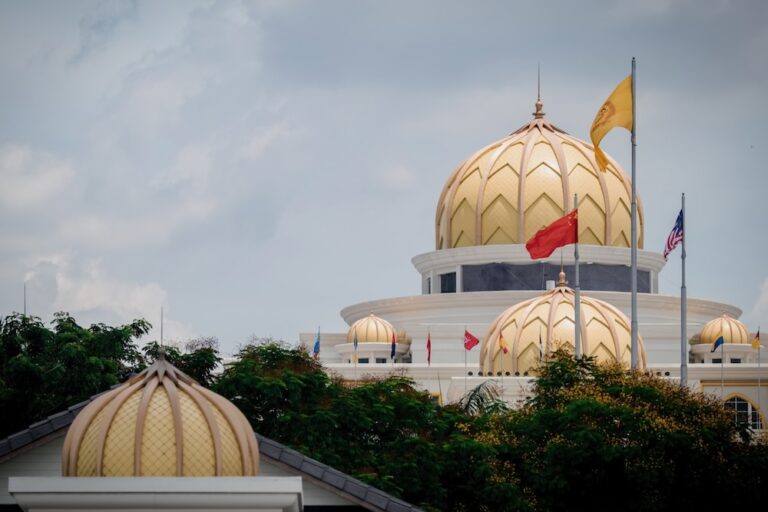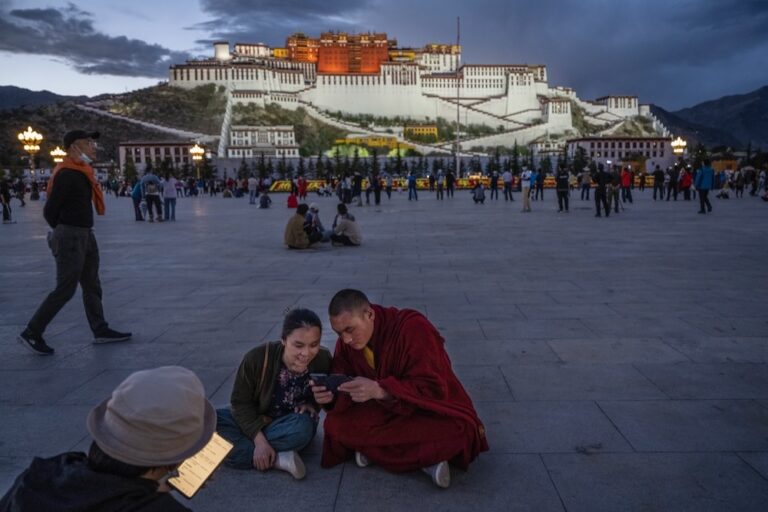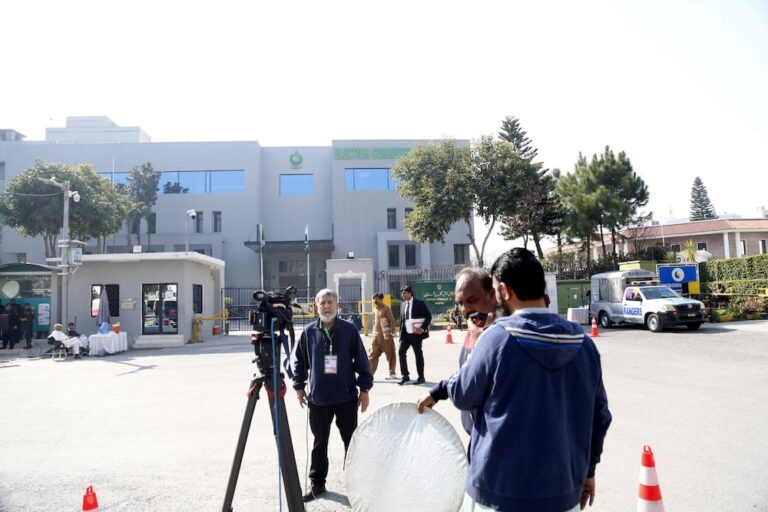October 2022 in Asia-Pacific: A free expression round up produced by IFEX's regional editor Mong Palatino, based on IFEX member reports and news from the region.
Pakistani journalists attacked in and out of the country, 100 days of media freedom decline in the Philippines, court convictions and harassment across the region, and the human rights implication of Xi Jinping’s re-election as China’s supreme leader.
What does Xi Jinping’s third term mean for freedom of expression?
China’s President Xi Jinping was given an unprecedented third term during the 20th Congress of the Chinese Communist Party.
Ahead of the Congress, human rights groups and media watchdogs highlighted the concerning legacy of Xi in suppressing freedom of expression. Reporters Without Borders (RSF) summarized Xi’s record as an enemy of media freedom:
- 115 journalists and press freedom defenders detained
- 3 press freedom defenders dead in prison
- 7 media outlets closed within two years in Hong Kong
Human Rights Watch (HRW) pointed out that, under Xi’s term, “authorities have decimated Chinese civil society, imprisoned numerous government critics, severely restricted freedom of speech, and deployed mass surveillance technology to monitor and control citizens”. It added the detention of a million Uyghurs and other Turkic Muslims, which a recent UN report referred to as a potential crime against humanity.
Jemimah Steinfeld, editor-in-chief of Index on Censorship magazine, shared how Xi’s hardline leadership has made it difficult for media groups to fulfill their work.
“I used to report for Index from China. Then I worked at Index with reporters from China. Today I struggle to get anyone to write for us on the ground, let alone talk to us on the record.”
The intensified censorship and systematic crackdown on dissenters before, during, and immediately after the Party Congress could be an indication of what will happen in China in the next five years.
But despite threats and massive surveillance, a lone protester was able to unfurl protest banners in a bridge in Beijing with the following message of defiance:
“We want food, not PCR tests. We want freedom, not lockdowns. We want respect, not lies. We want reform, not Cultural Revolution. We want a vote, not a leader. We want to be citizens, not slaves.”
This brave act inspired many individuals outside China to hang the same protest banners in a show of solidarity to Chinese citizens.
Journalists attacked inside and outside of Pakistan
A disturbing pattern in Pakistan: a former prime minister’s sexist remark against a female journalist, an official of a global media group detained for eight hours at Lahore airport, and a prominent journalist who recently fled to Kenya killed under mysterious circumstances.
Former ARY News TV host Arshad Sharif was shot dead while traveling in a car in Kenya. The veteran journalist – known for his criticism of the military – left Pakistan and went into exile in August, after sedition cases were filed against him. IFEX member the Pakistan Press Foundation (PPF) is calling for an investigation not just into the killing, but also into the emergence of an “environment of fear” that is forcing journalists like Sharif out of the country.
“The role of the state in creating this environment of fear must also be thoroughly investigated and ascertained in order to ensure that journalists working in Pakistan are able to continue their work without the fear of coming under threat.”
PPF has also called out former prime minister Imran Khan for sexist remarks directed against NewsOne anchorperson Gharidah Farooqi. Khan was responding to the physical and online harassment experienced by Farooqi during the former ruling party’s rallies. Instead of directing members to stop attacking the journalist, Khan continued to make remarks which PPF described as “irresponsible” and “likely to justify further attacks or abuse of women journalists.”
PPF has also expressed alarm over the eight-hour detention of Committee to Protect Journalists senior program consultant Steven Butler upon his arrival in Lahore. Butler was scheduled to participate in the 2022 Asma Jahangir Conference, but was told that he was on a “stop list” of the Interior Ministry. He was released following the ministry’s approval. PPF has asked authorities to provide information about the decision to detain Butler and the inclusion of journalists and media freedom advocates in the Ministry’s “stop list”.
Philippines: 100 days of press freedom decline
The National Union of Journalists of the Philippines (NUJP) has documented at least 17 press freedom violations in the Philippines since President Ferdinand Marcos Jr. assumed power on 1 July. The brazen murder of veteran journalist Percy Lapid drew widespread indignation and concerns about its chilling ripple-effects.
“The killing shows that journalism remains a dangerous profession in the country. That the incident took place in Metro Manila indicates how brazen the perpetrators were, and how authorities have failed to protect journalists as well as ordinary citizens from harm,” the NUJP said in a statement.
Meanwhile, the Court of Appeals has junked the petition of Rappler editor and Nobel Peace Prize laureate Maria Ressa to reverse her cyber libel conviction. She faces a prison term of almost seven years if the Supreme Court does not overturn the ruling. The Hold the Line Coalition, of which IFEX is a member, is asking the Marcos government to drop the charges against Ressa and to stop persecuting independent media outlets.
Ressa highlighted the unusual aspects of her case, which was filed during the term of former President Rodrigo Duterte, in a tweet.
Court convictions and harassment across the region
In Myanmar, the military government continues to convict journalists for reporting on the pro-democracy movement. Japanese journalist Toru Kubota, who was arrested in July while covering a protest in Yangon, was sentenced to seven years in prison for allegedly violating the electronic transactions law, three years for incitement, and three more years for violating the country’s immigration laws. Journalist Sithu Aung Myint, who has contributed reports to SkyNet, Frontier Myanmar, and Voice of America’s Burmese service, was sentenced to three years in prison with hard labour for “inciting government employees to commit crimes”. The junta has also threatened to file charges against BBC Burmese and The Irrawaddy for an alleged false report about a clash that led to the deaths of three civilians near a Buddhist pagoda in Mon state.
In Vietnam, journalist Le Manh Ha was sentenced to eight years in prison – to be followed by five years of house arrest – for “propaganda against the socialist state of Vietnam”. Prior to his arrest early this year, Ha had been posting video reports about corruption and land grabs on his YouTube news channel.
In Hong Kong, Reporters Without Borders (RSF) said authorities resurrected an archaic law to imprison radio host and political commentator Edmund Wan Yiu-sing, who was convicted this month for “sedition” and “money laundering”. Another conviction was handed out to Jimmy Lai, founder of the now-defunct media outlet Apple Daily, for fraud. He has been in detention since December 2020 for his alleged role in organizing pro-democracy protests in 2019, and could face a life sentence in prison if found guilty of violating national security laws.
“The authorities in Hong Kong and China are using my dad’s case to send a chilling message to all independent voices in the media and civil society: keep quiet or you’ll be next,” said Lai’s son, Sebastian Lai.
Support for Lai is pouring in from across the world. A petition was initiated by RSF calling for his release. Meanwhile, American students have been sending postcards to Lai in an act of solidarity.
In India, Kashmiri photojournalist Sanna Irshad Mattoo was barred by immigration officials from leaving the country to collect her Pulitzer Prize in New York. No reason was given for blocking her travel abroad, but it is another example of how arbitrary travel bans are undermining the work of independent journalists in India and Kashmir.
In brief: Good news
Afghanistan Journalists Center (AFJC) welcomed the release of journalists Abdul Hannan Mohammadi of Pajhwok Afghan News and Mirza Hasani of Radio Aftab after four months in detention. It insisted that the two should not have been arrested in the first place because they were simply doing their job as journalists. The group is now demanding the release of journalist Khalid Qadiri, who was sentenced to one year in prison in May for allegedly spreading anti-Islamic Emirate propaganda and committing espionage for foreign media outlets.
Malaysian artist Fahmi Reza was given a discharge not amounting to an acquittal (DNAA) by the Sessions Court in relation to his social media over the ban on liquor sales in Malaysia. The judge ruled that the charges are flawed and unfounded. Several artists and human rights groups have come forward to support Fahmi Reza and to assert that satire should not be considered as a crime.
Finally, HRW lauded India’s Supreme Court for issuing a progressive ruling on abortion rights. The ruling expanded abortion access to all women regardless of marital status, it is LGBTQI+ inclusive, and it included victims of marital rape as among those who can access abortion services. HRW said the ruling can become a standard for other countries.



